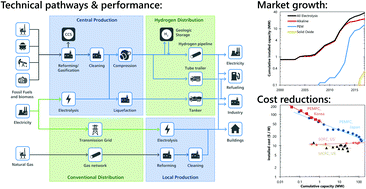The role of hydrogen and fuel cells in the global energy system
Abstract
Hydrogen technologies have experienced cycles of excessive expectations followed by disillusion. Nonetheless, a growing body of evidence suggests these technologies form an attractive option for the deep decarbonisation of global energy systems, and that recent improvements in their cost and performance point towards economic viability as well. This paper is a comprehensive review of the potential role that hydrogen could play in the provision of electricity, heat, industry, transport and energy storage in a low-carbon energy system, and an assessment of the status of hydrogen in being able to fulfil that potential. The picture that emerges is one of qualified promise: hydrogen is well established in certain niches such as forklift trucks, while mainstream applications are now forthcoming. Hydrogen vehicles are available commercially in several countries, and 225 000 fuel cell home heating systems have been sold. This represents a step change from the situation of only five years ago. This review shows that challenges around cost and performance remain, and considerable improvements are still required for hydrogen to become truly competitive. But such competitiveness in the medium-term future no longer seems an unrealistic prospect, which fully justifies the growing interest and policy support for these technologies around the world.



 Please wait while we load your content...
Please wait while we load your content...